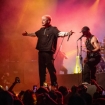Thanks to a unique blend of New York hardcore, New York hip-hop and New York noise, sludge-punk trio Show Me the Body have had a surprisingly successful run with a disgustingly aggressive sound. They've graced the Coachella stage, hit the European festival circuit and are doing a headlining American tour this spring. However, there's still a good chance they may reach out and touch you: The band is fond of outdoor guerilla sets.
"We like to do generator shows, and we like to play free shows," says Julian Cashwan Pratt, the band's vocalist and banjo assault machine. "It's just about getting out of the venue, doing something that's, like, actually in the streets. It's super cool to go around with your own shit and be 100 percent sufficient. The goal is to, like, own the building. You wanna own the factory that you work in."
Pratt had an early version of SMTB already cooking when he met bassist Harlan Steed in ninth grade in Manhattan's progressive Elisabeth Irwin High School. Pratt says they didn't have much in common "besides just both being from New York and just being kids running around trying to get high and have fun." Pratt was spending many Saturdays at NYC institution ABC No Rio watching bands on the crust and hardcore spectrum; Steed was more engrossed with the Zappa, Beefheart and Fugs albums in his dad's record collection. However, they connected over the music they were playing with Pratt's older cousin Gabriel Millman, a drummer who was into New York's homegrown salsa music and is currently the band's in-house producer.
Pratt went to Hampshire College in Massachusetts for a year but says he "couldn't swing it." There he met local drummer Noah Cohen-Corbett, who joined the band in 2013, and they returned to New York where they started playing their unique blend of harshness at hardcore shows: a mix of grimy sludge metal, barked raps, blown-out noise and Pratt's tinny banjo.

"My cousin started playing the banjo and he showed it to me," says Pratt. "I liked it immediately, 'cause it was a lot simpler than guitar. I don't play it like a banjo. I play it like a guitar. It's just less strings, so a lot simpler to wrap your head around. And then once I got a Humbucker pickup, I realized that I could create a lot of sick noise with it. The feedback was special, because it wasn't just electronics feeding back on itself, but it was electronics going through a head that was vibrating. That's become a part of the band."
That broken sound is the tone in Steed's bass, as well, a sickening parp of moldy molasses. "I have a lot of input gain on my signal. I send a lot of sound to the amplifier, and I don't even have to turn it up that loud, 'cause it's so fucking loud going in," says Steed. "I really look for a sound that sounds like it's breaking up – like the sound is literally breaking. A lot of bass players play with a specific kind of finesse, where it's about … being very precise, where I really hit my shit hard. I use a brass pick to really make that shit clank. When I play it hard, I feel like I'm actually playing."
The band's genre-crossing sound and melting-pot mindset made them friends with a lot more than other hardcore bands, forming the Letter Racer musical collective with their school pals in the rap group Ratking. They spent the summer of 2014 touring with Ratking and putting their debut EP, Yellow Kidney, on SoundCloud. They got the attention of Loma Vista who reissued it as a 12-inch and have helped with the release of 2015's SMTB EP, 2016's debut full-length Body War and 2019 follow-up Dog Whistle. Despite national distribution, they still keep things close with the occasional guerilla show.
"You gotta go under a highway or somewhere where there's a lot of noise already. So you kinda blend in," says Pratt. "The last two times we've played generator shows in New York it's rained. And so that was pretty sick. Like, the 50 people who showed up to both of those shows in the rain under the Manhattan Bridge, those were fucking sick shows. The second one that we did the parks department cops pulled up. But then my older homie grabbed a beer and, like, pretended to be drunk, and they had him pour it out. [He] created a small diversion and so helped deescalate the situation."
Show Me the Body's latest studio offering is Dog Whistle, a tight, under-30-minute spill of lurching bass, dead-eyed spoken word interludes and raging punk blasts. Pratt says the album is for the band's friends – "those who we still have or we've lost" – and the community they've built. But the album's subject matter comes with a worldview that spreads well beyond New York's borders. Opening track "Camp Orchestra" – a desolate, pastoral, minimal suite that opens up into a mid-tempo alt-metal rager – was inspired by a trip to the Auschwitz-Birkenau Memorial and Museum that the band took while overseas to play a Polish music festival.
"It was like an incredibly emotional experience for all of us. It was devastating and also incredibly inspiring at the same time, because we were getting outside of our city. We were really seeing the world in that moment in time," says Steed. "I remember walking through the camp and seeing this sign that was talking about the camp orchestras that played, at concentration camps. They were, you know, Jews, prisoners of war, anyone who could play music well enough to accompany mass murder."

The song's video, released in February, is an austere, haunting clip that spends nearly a full minute on a single shot of a pile of shoes. "That particular image," says Steed, "it really just stood for a loss of individualism, a stripping of the people of their humanity."
"The shoe room is almost a cliché of the holocaust," says Pratt. "Like, it's such common knowledge that there were rooms with all their belongings, and rooms with glasses, rooms with gold teeth and shoe rooms. It's basically just to say that this shit continues. Like, we all grew up with stories from the people who came to this country, who escaped that hatred and that violence to come and live here, like, all the struggle that they went through so that we could live here and just make music. You have to understand those stories that our people went through, and then understand that they're still happening in this country, to other people. The holocaust is a continuous thing. The holocaust is happening all the time all around you."
Below, watch Show Me the Body eat bagels, debate a priest and throw down at an art museum in our exclusive "Breakfast and a Show" video:








